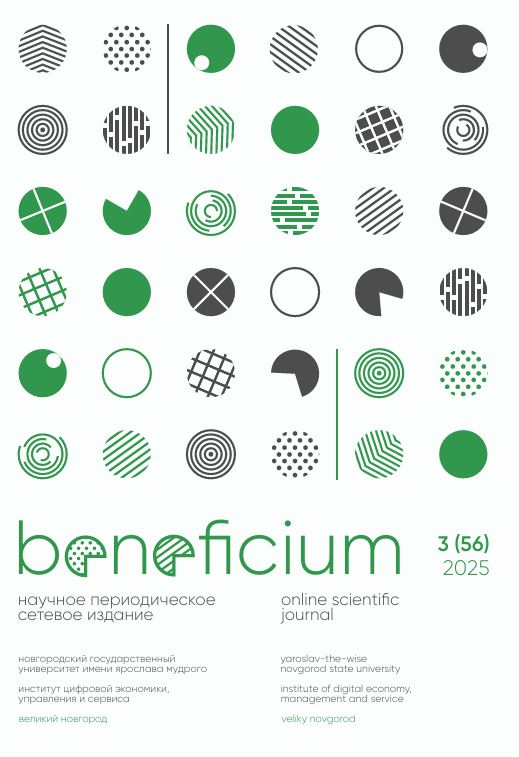HUMAN-CENTERED ORGANIZATION MODEL: AN EVOLUTIONARY APPROACH BASED ON CATEGORICAL-SYSTEM METHODOLOGY
Abstract
This article examines the development of theoretical approaches to the concept of the human-centered organization. The relevance of the study is determined by the crisis of the traditional instrumental paradigm of management and the necessity of forming a new conceptual foundation for organizational development. The humanistic transformation of organizations is becoming an objective necessity, which necessitates a revision of traditional management paradigms. The human-centered organization is considered both as a managerial innovation and a fundamental shift in the understanding of the nature of organizational systems, based on humanistic values that place the individual at the core of their activities. The aim of this research is to develop an evolutionary model of a human-centered organization based on a categorical-system methodology. The research employs the “Finite information flow” method as its primary tool, which allows for modelling the logic of an object's qualitative complexity and treats the object as a bearer of specific qualities that emerge and are superseded throughout its evolution. The main theoretical prerequisites for the transition to a humanistic perspective are summarized. A two-dimensional model is proposed, integrating two vectors of evolution: the attitude toward the person and the dominant management system. For each vector, described in terms of the “Finite information flow” method, the following elements are outlined: logical levels, informational criteria, and logical limits. Aт integrated matrix of organizational archetypes is introduced, enabling the identification of a system's current state and the design of trajectories for organizational transformation toward a humanistic perspective. A brief characterization of the organizational archetypes is provided, with unstable archetypes and key organizational development trajectories being identified. It is demonstrated that the developed two-dimensional model is consistent with contemporary theoretical approaches and serves as an integrative methodological framework. The findings open oportunities for further research, including the validation of the proposed archetypes, the investigation of mechanisms behind organizational transitions, and the development of tools for assessing an organization's level of humanistic maturity.
Keywords: humanism, humanistic management, categorical-system methodology, finite information flow, organizational archetypes, human-centered organization, evolutionary model
References
- Domingo V., Melé D. Re-Thinking Management: Insights from Western Classical Humanism // Humanistic Management Journal. 2022. Vol. 7(1). Pp. 1-21. DOI:1007/s41463-021-00115-z
- Melé D. Understanding Humanistic Management // Humanistic Management Journal. 2016. Vol. 1(1). Pp. 33-55. DOI: 10.1007/s41463-016-0011-5
- Pirson M. Humanistic Management: Protecting Dignity and Promoting Well-Being. Cambridge: Cambridge University Press, 2017. 310 p. DOI:1017/9781316675946
- Pirson M. Leading for Well Being - Dignity as Cornerstone // Humanistic Management Journal. 2021. Vol.6(2). Pp. 147-150. DOI: 10.1007/s41463-021-00108-y
- Nasyrova S.I. Human-Oriented Economy: Goals and their Contradictions // π–Economy. 2022. Vol 15(2). Pp.38-58. (In Russ.). DOI: 10.18721/JE.15203.
- Ovchinnikova O.P., Lebedeva D.V. Creating a Human-Centered Organizational Model in Modern Conditions // Creative Economy. 2023. Vol. 17(9). Pp. 3269-3282. (In). DOI: 10.18334/ce.17.9.118832
- Dyck B. The Integral Common Good: Implications for Melé's Seven Key Practices of Humanistic Management // Humanistic Management Journal. 2020. Vol.5(1). Pp. 7-23. DOI: 10.1007/s41463-020-00083-w
- Litau E.Ya., Sologub A.N. The Concept of Human-Centricity as a Basis for Digital and Value Transformation in the Management of Modern Entrepreneurial Projects // Economics and Management. 2024. Vol. 30(6). Pp. 728-739. (In Russ.). DOI: 10.35854/1998-1627-2024-6-728-739
- Galchenko S.A., Sezonova O.N., Khodyrevskaya V.N., Trubnikova V.V., Ryumshin A.V. Human-Centricity as a Necessary Condition for the Economy of the Future // Leadership and Management. 2022. Vol. 9(2). Pp. 309-322. (In). DOI: 10.18334/lim.9.2.114587
- Falko S.G. Gumanisticheskaya napravlennost' innovacij v menedzhmente [Humanistic orientation of innovations in management] // Innovations in Management. 2020. Vol. 1(23). Pp. 2-3. (In Russ.).
- Krasova E.V. Human Resource Management Approaches in Information Technology // Bulletin of the South Ural State University. Series “Economics and Management”. 2024. Vol. 18(4). Pp. 115-124. (In Russ.). DOI: 10.14529/em240409
- Lukashevich N.S. Human-Centered Organization: from Theoretical Models to Categorical-System Methodology // Leadership and Management. 2025. Vol. 12(8). (In). DOI: 10.18334/lim.12.8.123655
- Townsend M., Romme A.G.L. The Emerging Concept of the Human-Centered Organization: A Review and Synthesis of the Literature // Humanistic Management Journal. 2024. Vol. 9(1). Pp. 53-74. DOI: 10.1007/s41463-024-00168-w
- Nakanishi Y. Human-Centered Organization and Innovation // The Learning Organization. 2023. Vol. 30(6). Pp.877-883. DOI: 10.1108/TLO-09-2023-299
- Nasyrova S.I. Thesaurus of the Human-Oriented Economy Subject Area // Proceedings of the Southwest State University. Series: Economy. Sociology. Management. 2022 Vol. 12(8). Pp. 95-111. (In Russ.). DOI: 10.21869/2223-1552-2022-12-6-95-111
- Nasyrova S.I. Evolutionary Aspects of the Human-Oriented Economy in the Categorical-System Methology // Moscow University Economic Bulletin. Pp. 202-223. (In Russ.). DOI: 10.38050/0130010520216.10
- Samarskaya N.A. The Apparatus of Categorical-System Methodology in the Study of Labor Protection // Russian Journal of Labor Economics. 2023. Vol. 10(7). Pp.1113-1130. (In Russ.). DOI: 10.18334/et.10.7.117908
About the Author
Nikita S. Lukashevich – Cand. Sci. (Economics), Docent; Associate Professor, Peter the Great St. Petersburg Polytechnic University, Saint Petersburg, Russia. E-mail: lukashevich@spbstu.ru. SPIN РИНЦ 2033-9189. ORCID 0000-0001-5719-4844. Researcher ID K-4288-2012. Scopus Author ID 56027472300
For citation: Lukashevich N.S. Human-Centered Organization Model: an Evolutionary Approach Based on Categorical-System Methodology // BENEFICIUM. 2025. Vol. 3(56). Pp. 30-38. (In Russ.). DOI: 10.34680/BENEFICIUM.2025.3(56).30-38









